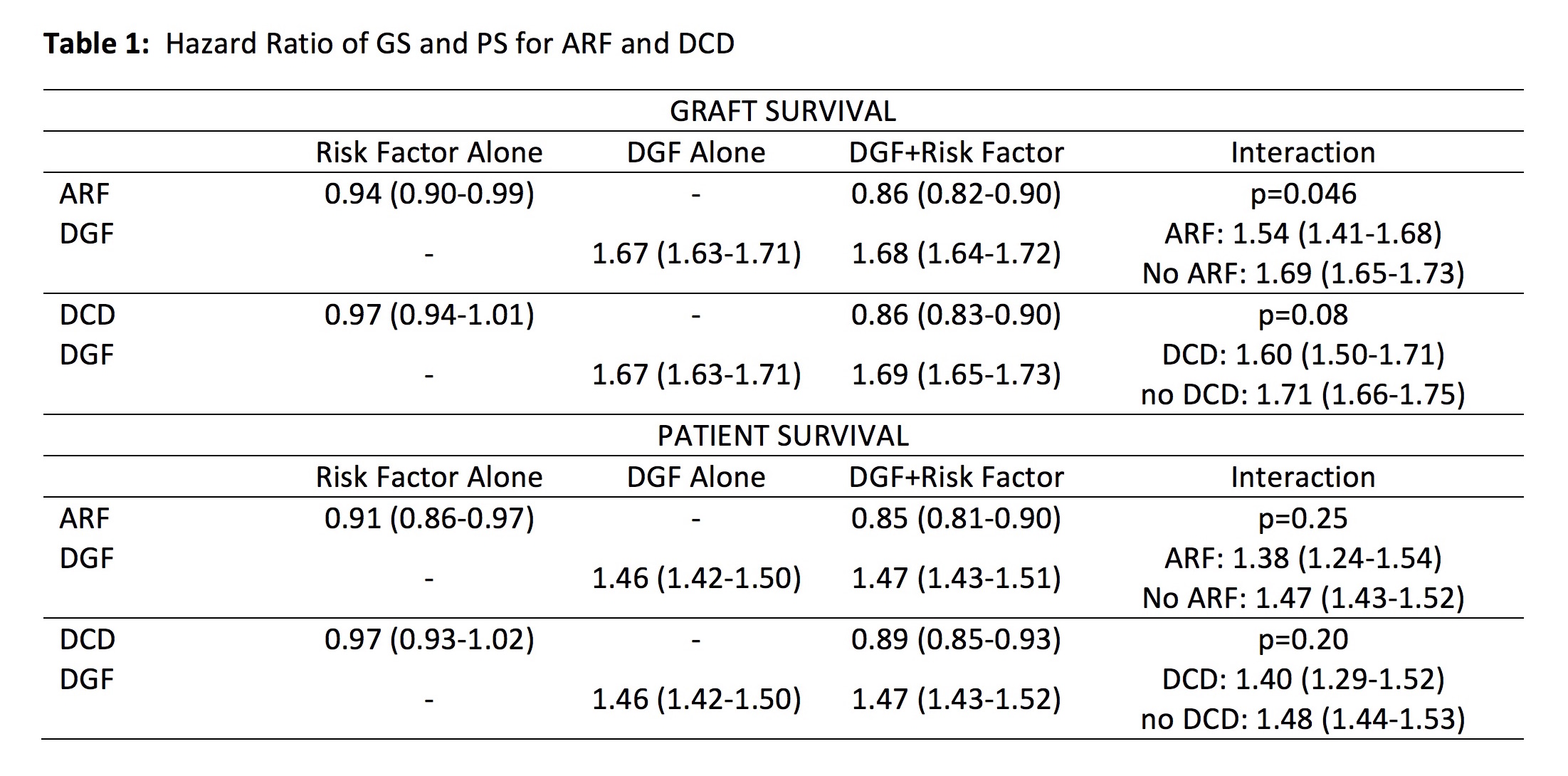Delayed Graft Function[mdash]Less Ominous for ARF or DCD Recipients?
University of Michigan, Ann Arbo
Meeting: 2017 American Transplant Congress
Abstract number: 488
Keywords: Donors, Graft failure, Graft function, Kidney transplantation, marginal
Session Information
Session Name: Concurrent Session: DCD and Infectious Risk Kidney Donors
Session Type: Concurrent Session
Date: Tuesday, May 2, 2017
Session Time: 4:30pm-6:00pm
 Presentation Time: 4:30pm-4:42pm
Presentation Time: 4:30pm-4:42pm
Location: E450b
Delayed Graft Function (DGF) is both a transplant outcome and risk factor for graft failure. Kidneys from donors with kidney injury–such as acute renal failure (ARF) and donation after cardiac death (DCD)–are more likely to develop DGF, yet do not have significantly worse graft outcomes. Due to the relationship between risk factors and DGF, they may not independently influence graft survival (GS) and patient survival (PS). We sought to determine whether the impact of DGF on GS and PS was different in ARF and DCD kidneys.
Methods: SRTR data was used to identify deceased donor transplants between Jan 2003 and Jun 2016. Multivariable Cox regressions estimated the effect of each risk factor alone, DGF alone, both the risk factor and DGF, and the interaction between risk factor and DGF on GS and PS.
Results:
Of 114,587 transplants, 8118 (7.1%) received ARF donor kidneys (Cr>2.0) and 15,298 (13.4%) received DCD kidneys. When not accounting for DGF, recipients of DCD kidneys did not have significantly different GS (HR=0.97; CI=0.94-1.01) or PS (HR=0.97; CI=0.93-1.02) than non-DCD recipients. Recipients of ARF kidneys had better PS (HR=0.91; CI=0.86-0.97) but no difference in GS (HR 0.94; 0.90-1.02) compared to non-ARF kidneys. DGF alone decreased GS (HR=1.67; CI=1.63-1.71) and PS (HR=1.46; CI=1.42-1.50); this was unchanged after adjustment.
Interactions between risk factors and DGF were marginally significant (p<0.10). GS reduction due to DGF was lower in ARF than non-ARF recipients (HR 1.54 vs. 1.69, interaction p=0.049) and the risk of graft failure due to DGF was lower in DCD than non-DCD recipients (HR 1.60 vs. 1.71, interaction p=0.08). Interactions were not significant for PS. When models were adjusted for KDRI interactions for GS were not significant (ARF interaction p=0.25, interaction p=0.24), but trended toward similar results. Conclusion:
Conclusion:
DGF in kidneys with acute injury (ARF, DCD) is less likely to result in graft failure compared to DGF in other kidneys. This suggests that DGF portends a worse outcome for non-DCD/ARF kidneys, which may be attributable to other aspects of donor quality. This also explains why injured kidneys do not have inferior outcomes despite higher rates of DGF.
CITATION INFORMATION: Barrett M, Smith A, Woodside K, Sung R. Delayed Graft Function[mdash]Less Ominous for ARF or DCD Recipients? Am J Transplant. 2017;17 (suppl 3).
To cite this abstract in AMA style:
Barrett M, Smith A, Woodside K, Sung R. Delayed Graft Function[mdash]Less Ominous for ARF or DCD Recipients? [abstract]. Am J Transplant. 2017; 17 (suppl 3). https://atcmeetingabstracts.com/abstract/delayed-graft-functionmdashless-ominous-for-arf-or-dcd-recipients/. Accessed January 31, 2026.« Back to 2017 American Transplant Congress
